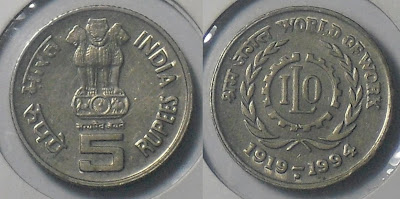5 rupee: Bhagwan Mahavir janm kalyanak
 This coin was released on the occasion of the 2600th Mahavir Jayanti, or the 2600th birth anniversary of Lord Mahavira, who is revered by the Jain community.
This coin was released on the occasion of the 2600th Mahavir Jayanti, or the 2600th birth anniversary of Lord Mahavira, who is revered by the Jain community.Shramana Bhagwan Mahavir was the last Tirthankar in the Avasarpini phase or the phase of decline. He was a contemporary of Gautam Buddha, Lao-Tse, Confucius, Socrates, etc. Bhagwan Mahavir was born on Monday the 13th day of the Shukla -the bright fortnight of Chaitra according to the Indian Calendar that is on the 30th of March 599 B. C. at Kshatriyakunda (in Bihar). He was born as Vardhman Kumar to King Siddhartha and Queen Trishala. When he was 30 years of age, he renounced his worldly life and assumed the life of Sädhanä or spiritual endeavour on Mondav the 10th day of Krishna Paksha the black fortnight of Kartik according to the Indian Calendar that is on 19th December 569 B.C. He performed a severe and austere penance for twelve and a half years and then on Sunday, the 10th day of Shukla of Vaishäkh that is 13th April 558 B.C., he attained Kevaljnan or absolute enlightenment. He preached his first message on the 11th day of Shukla Paksha of Vaishakh and showed the multidimensional path for the attainment of selfpurification and selfperfection. The same path shown by him is followed today. On Tuesday, the new Moon day in Kartik, i.e , on the 15th October 528 B.C. Lord Mahavir attained salvation, Moksha and his life ended with his attainment of absolute deliverance.
When the celebrations for the 2600th Mahavir Jayanti ended, the then Prime Minister Mr. Atal Behari Vajpayee released commemorative set of Bhagwan Mahavira having coins in the denomination of Rs 5 and Rs 100.
5 rupee: ILO
 The International Labour Organization (ILO) is devoted to advancing opportunities for women and men to obtain decent and productive work in conditions of freedom, equity, security and human dignity. Its main aims are to promote rights at work, encourage decent employment opportunities, enhance social protection and strengthen dialogue in handling work-related issues.
The International Labour Organization (ILO) is devoted to advancing opportunities for women and men to obtain decent and productive work in conditions of freedom, equity, security and human dignity. Its main aims are to promote rights at work, encourage decent employment opportunities, enhance social protection and strengthen dialogue in handling work-related issues.In promoting social justice and internationally recognized human and labour rights, the organization continues to pursue its founding mission that labour peace is essential to prosperity. Today, the ILO helps advance the creation of decent jobs and the kinds of economic and working conditions that give working people and business people a stake in lasting peace, prosperity and progress.
Origins and history
The ILO was founded in 1919, in the wake of a destructive war, to pursue a vision based on the premise that universal, lasting peace can be established only if it is based upon decent treatment of working people. The ILO became the first specialized agency of the UN in 1946.
ILO's vision of decent work
Work is central to people's well-being. In addition to providing income, work can pave the way for broader social and economic advancement, strengthening individuals, their families and communities. Such progress, however, hinges on work that is decent. Decent work sums up the aspirations of people in their working lives.
Tripartism and social dialogue
The ILO is the only 'tripartite' United Nations agency in that it brings together representatives of governments, employers and workers to jointly shape policies and programmes. This unique arrangement gives the ILO an edge in incorporating 'real world' knowledge about employment and work.
International labour standards
The ILO is the global body responsible for drawing up and overseeing international labour standards. Working with its Member States, the ILO seeks to ensure that labour standards are respected in practice as well as principle.
Working out of Poverty
Poverty remains deep and widespread across the developing world and some transition countries, with an estimated 2 billion people in the world today live on the equivalent of less than USD 2 per day. In the view of the ILO, the main route out of poverty is work.


No comments:
Post a Comment